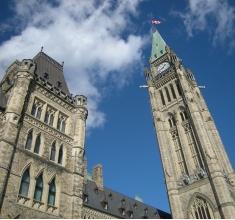The Commons justice committee had started a study on Section 13 of the Canadian Human Rights Act in the previous session of Parliament, but the government’s decision to prorogue killed the committee — and the study.
Now that Parliament has come back and the committee has resumed, is the study going to come back as well? Not necessarily.
“We had a meeting of the steering committee last week,” says Liberal justice critic Dominic LeBlanc. “This didn’t come up.”
Section 13 of the CHRA governs the transmission of hate speech over telephone and internet. There have been calls to have the section repealed in favour of freedom of expression, seeing the provisions as contravening the Charter of Rights and Freedoms. As well, opponents of Section 13 argue that it establishes a lower threshold for offences than the two hate speech laws that appear in the Criminal Code. (read more about Section 13 in Xtra’s achives)
“We’d sort of begun to scratch the surface [of the study],” says Conservative MP Brent Rathgeber, a proponent of repealing Section 13. “We’d had two or three days of hearings, and heard from the human rights commissioner, and of course from Ezra [Levant] and Mark Steyn. On an unrelated hearing day, we heard from a recent appointee to the human rights commission tribunal — we were just speaking to her, or confirming her appointment.”
Rathgeber had stated his intention to revisit the issue when Parliament resumed, and he mentioned that the committee had a mechanism to adopt the evidence previously heard.
The NDP’s justice critic, Joe Comartin, has heard that Conservatives on the committee want to resume the study, but they appear to be giving it no priority.
“Given the backlog of bills, and other work, studies that we’re doing on organized crime, I have a hard time quite frankly seeing us doing anything more on that at least in this year, and I expect an election sometime this year, so I think it probably is not going to go anyplace.”
LeBlanc sees the utility of the study but isn’t about to make a priority of it either.
“We’re going to wait to see what the government wants to do,” LeBlanc says. “My view was that there was a very legitimate basis for some human rights commission review with respect to Section 13. We’ve heard evidence about how we can perhaps increase some of the procedural protections, but you’re certainly not going to see the Liberals leading a charge to re-open that at this point, and if the government decides to let it go, that certainly would be fine with us.”


 Why you can trust Xtra
Why you can trust Xtra


